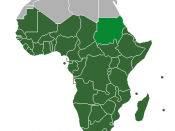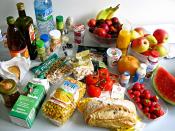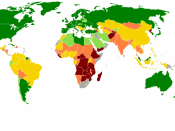The recent famines witnessed across southern, and more recently eastern Africa have revived international attention to the pressing questions of why Africa and why again? It is the very focus of this essay to address these questions through analysing the situation of food insecurity in Africa and the underlying 'causes', but also to question, through comparison to other 'major world regions' the assumption that Africa is experiencing the worst situation of food insecurity and therefore causing the most 'concern' to the international donor community. Where a recent FAO report on global food insecurity estimates that 777 million of the 815 global food insecure live within the Developing world (FAO 2001 (a): 1). Analysis and comparison of food security situations will therefore focus upon the major Developing regions, categorised by the FAO as 'sub-Saharan Africa', 'Latin America and the Caribbean' and 'Asia and the Pacific'. 'Food Security' is defined as the "access of all people at all times to enough food for an active, healthy life" (World Bank 1986, cited in Sijm 1997: 8).
The 'causes' of food insecurity will therefore be perceived as those that constrain both food 'availability' and 'access'. The analysis of the African food security situation and it's 'causes' will be interlinked with arguments surrounding the concept of food security itself. This is because the perspective on food security taken shapes the analytical outcome of the food security situation and the underlying 'causes'. In particular, whether failed 'availability' of, or 'access' to food is emphasised, and what scale food security analysis is focussing upon; national or household. In Malthusian argument 'food balance' is the key indicator of food security, and thus national food 'availability'. Sen's 'entitlement' theory in contrast perceives food insecurity as a household issue associated with the failure to 'access'...


